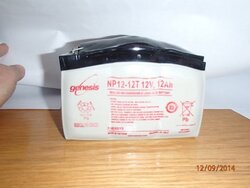Many pellet folks appear to back up their power with computer type UPS units. They usually have several sealed batteries that are maintenance free in side the case. The unit I use on my office equipment is one of these style. Last week after coming back home to my house I smelled an odd odor in my home office. I traced it to an APC UPS. It was easy to trace as the unit was beeping and lights were flashing. I went to touch the units case and it was very hot to the touch. I quickly unplugged it and pulled the disconnect jumper from the back. I finally had a chance to open up the UPS this morning . The two battery cases were swelled up on the top and all four sides with the two batteries stuck together. In some spots the case had expanded as much as 1" It took me a bit to pry them out of the frame as they swelled into the gaps in the frame. I had a pair of spare batteries so I installed them and the UPS seems to be working correctly. No trace of battery acid.
There was no damage to the surroundings but I expect there could have been. These batteries were about time for replacement, but the last time I was given some front end warning during the automatic tests and shut it down when it indicated it had lost capacity. I was given no warning this time. It was working properly the day before with no beeps or warnings.
This UPS is known generally quality brand (APC smart UPS 1000).
I would suggest that if you do run a UPS that you probably keep it on a non combustible surface and definitely not cover it with anything.
There was no damage to the surroundings but I expect there could have been. These batteries were about time for replacement, but the last time I was given some front end warning during the automatic tests and shut it down when it indicated it had lost capacity. I was given no warning this time. It was working properly the day before with no beeps or warnings.
This UPS is known generally quality brand (APC smart UPS 1000).
I would suggest that if you do run a UPS that you probably keep it on a non combustible surface and definitely not cover it with anything.


